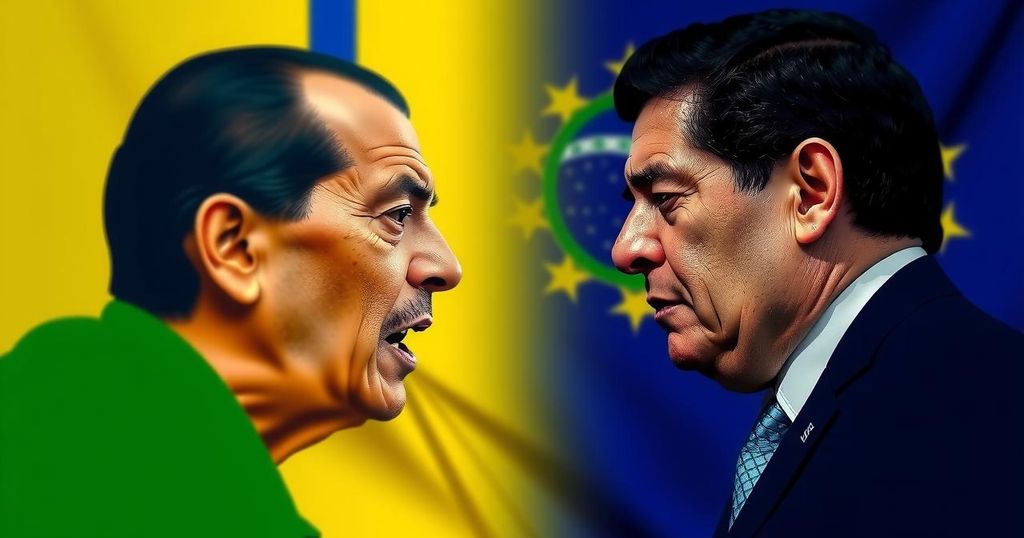Rising Diplomatic Tensions Between Brazil and Venezuela at BRICS Summit

At the BRICS summit in Kazan, Russia, diplomatic tensions escalated between Brazil and Venezuela following Brazil’s veto of Venezuela as a partner state. The lack of official explanation from President Lula, who did not attend the summit due to an accident, has left Venezuela accusing Brazil of betrayal. The situation reflects significantly on regional diplomatic relationships and Brazil’s foreign policy direction under Lula, especially regarding its handling of Venezuela’s contentious political landscape and its implications for BRICS’ future.
The recent BRICS summit in Kazan, Russia, witnessed rising diplomatic tensions between Brazil and Venezuela following Brazil’s veto of Venezuela’s accession as a partner state to the bloc. This action adds to the complexities of their already strained relations, which have been exacerbated after the controversial re-election of Nicolás Maduro as president of Venezuela. Notably, President Lula of Brazil did not attend the summit due to a domestic issue and has not publicly articulated the rationale behind the veto, which Caracas has termed a “stab in the back.” Diplomatic conversations indicated that the nature of Venezuela’s recent electoral process and historical ties between Venezuelan leadership and Brazil’s Workers’ Party influenced Brazil’s decision. Despite Maduro’s victory in Venezuela’s elections being met with opposition criticism, Brazil’s Foreign Ministry expressed trust in the electoral process while simultaneously negotiating with Colombia for dialogue with the Venezuelan government. Venezuelan officials responded sharply, emphasizing the need for an internal resolution of electoral questions, criticizing Brazil’s stance as hostile, and linking it to ongoing sanctions against Venezuela. Maduro has alleged that Foreign Minister Mauro Vieira committed to not obstructing Venezuela’s BRICS membership during their discussions, while Caracas has laid blame on diplomat Eduardo Paes Saboia for the veto, suggesting his ties to previous Brazilian administrations colored his actions. Political analysts suggest that Venezuela’s response seeks to express dissatisfaction without severing dialogue, positing that this discontent reflects a shift in Brazilian policy compared to previous administrations. Furthermore, Maduro’s statements insinuate potential political consequences for Brazil’s present government, questioning the influence of U.S.-aligned training within Brazilian foreign relations education. In response to the veto and the ensuing declarations, relations between the two nations remain precarious, with Brazilian diplomats indicating a desire to allow time for negotiations and a possible reconsideration of Venezuela’s application to join the BRICS coalition as a partner state. Discussions around the implications of this veto highlight concerns regarding Brazil’s role in regional integration and progressive diplomacy, as observers note that such decisions could alienate Brazil from its aspirations of leadership in Latin American political context. The situation remains fluid, with both nations weighing the potential repercussions of their diplomatic interactions as Brazil prepares to assume the BRICS presidency in 2025, which will entail significant influence in future member discussions. Failure to remedy grievances before this pivotal moment may further complicate Brazil’s relationships within the bloc and with neighboring Venezuela, especially given the latter’s substantial oil reserves that represent a significant asset to BRICS’ collective interests in global energy markets.
The tension between Venezuela and Brazil has historical roots within the broader context of South American politics. Following a contentious electoral victory for President Nicolás Maduro in Venezuela, Brazil under President Lula faces criticisms from various factions regarding its foreign policy direction, specifically concerning its stance on alliances and diplomacy with Venezuela. The BRICS group’s potential expansion and Brazil’s role as a key player in this dynamic are crucial as they relate to energy supplies and geopolitical alliances. The recent veto against Venezuela’s BRICS membership indicates a divergence in policy between Lula’s current administration and previous ones that had been more supportive of Venezuela, highlighting the delicate balance between maintaining regional relationships and responding to domestic and international pressures.
The diplomatic friction between Brazil and Venezuela, ensuing from Brazil’s veto of Venezuela’s BRICS membership, encapsulates broader issues related to electoral legitimacy, regional alliances, and historical animosities. As both nations navigate the complexities of their relationship, it remains imperative for Brazil to recalibrate its diplomatic stance to uphold its commitment to regional integration and avoid long-term estrangement from a neighboring state rich in resources critical for shared geopolitical interests. The outcome of these tensions will likely shape Brazil’s influence within BRICS and its standing in South American affairs moving forward.
Original Source: www.brasildefato.com.br







